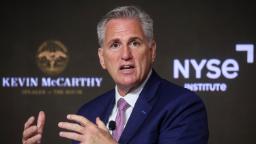
CNN
—
Millions of Americans could face massive consequences unless Speaker Kevin McCarthy can navigate out of a debt trap he has set for President Joe Biden that is instead threatening to capture his House Republicans.
The California Republican traveled to Wall Street on Monday to deliver a fresh warning that the House GOP majority will refuse to lift a cap on government borrowing unless Biden agrees to spending cuts that would effectively neutralize his domestic agenda and neuter his White House legacy.
McCarthy also assured traders, however, that he would never let the US government default on its obligations – a potential disaster that could halt Social Security payments, trigger a recession and unleash job cuts by the fall in the event that the debt ceiling is not raised.
This is where the risk to Americans comes in. It’s hard to see how a rookie speaker, with a tiny majority and a conference containing plenty of extremists, can engineer either of these outcomes.
Most countries don’t require the legislature to raise the government’s borrowing threshold. But the quirky situation in the US has made a once routine duty an opportunity for political mischief in a polarized age. Since the government spends more than it makes in revenue, it must borrow money to service its debt and pay for spending that Congress has already authorized. It has no problem getting more credit since the US pays its bills and has always had a stellar credit rating, despite one previous downgrade from the threat of default.
At least, that’s the way it has worked until now.
McCarthy beseeched his conference in a closed-door meeting on Tuesday to line up behind a bill that would raise the debt limit for a year but require a flurry of spending concessions from Biden. He styled the measure as an initial way of forcing the president to the negotiating table. But the bill is purely tactical since it’s got no chance of passing the Democratic-led Senate.
But in a sign of how difficult it will be for the speaker to even pull this gambit off, there were signs of internal disagreement on what should be in the package among GOP members.
Rep. Scott Perry, the chairman of the hardline House Freedom Caucus, was frustrated about a lack of specificity in the plan and wanted steeper cuts.
“I don’t know what’s in the package completely. That’s the issue,” Perry told reporters. Some members seem reluctant to commit so far. Conservative Rep. Tim Burchett told CNN’s Manu Raju, “I’m open to it but I’m still a ‘no’ vote.”
It is not unusual for various factions in a congressional majority to haggle over details before a final package is agreed. And House Financial Services Chair Patrick McHenry, a McCarthy ally, was confident the plan would pass the House. “The question is, what does the White House then do once we pass this package? We’ve clearly stated there is no clean debt ceiling that will pass the House,” he added. “So we’ll have the first opening offer here. And we’ll see if the president’s willing to come to the table and negotiate like previous presidents have.”
McHenry’s comment, however, reflected a big flaw in the GOP strategy since it relies on McCarthy’s belief that Biden will have no choice but to come to the table. The White House has insisted the House should do its job and pass a simple bill that only raises the borrowing limit
In effect, McCarthy has already set up a severe test of his leadership since there’s no guarantee that he can pass the measure in a House where he can only lose four votes and in which there are few signs the fractious GOP can agree on what programs to cut and by how much. And even if the measure does squeeze through the House in the coming weeks, it will likely be an idealized Republican product on which Biden and the Democratic Senate will never bite. Any subsequent package that emerged would almost certainly feature concessions that could splinter its GOP support.
Still, the speaker was typically bullish when he predicted Monday he’d have the votes to pass his initial bill.
“I think we got 218 to raise the debt ceiling,” McCarthy told CNN. “We’ve got a lot of consensus within the conference. We’ll get together and work through it.”
His assurances may not be very reassuring, however, because his similarly blithe predictions that he had the votes to win the speakership in January degenerated into a farcical process that saw him make huge concessions to his party’s most radical members and required 15 ballots before he finally won the job of his dreams.
But with the debt ceiling, it will be Americans’ livelihoods and the global economy, rather than McCarthy’s immediate political ambitions, that are on the line.
Republicans are yet to agree on their own demands
So far, Republicans seem to be having trouble negotiating with themselves, let alone Biden. Republican Rep. Dusty Johnson of South Dakota, who is helping to fashion the GOP’s position, said that while the party hopes to pass the initial bill next week, challenges remain.
“I think the hardest part is just that there are an unlimited number of conservative policy victories that, of course, we all want to see worked in,” Johnson told CNN’s Manu Raju. “The reality is that in a negotiation, you never get everything you want. And so I think our biggest issue right now is how do we squeeze these thousands of desires down to a manageable and credible number of asks?”
Another complication is that some members of the Republican conference have said they will never vote to raise the debt ceiling on principle – no matter what. In a powerful Republican majority such holdouts could be ignored. In McCarthy’s narrow majority – secured after a 2022 midterm election that fell short of GOP expectations – they have real leverage. And Democrats have little incentive to help McCarthy out in the event of GOP defections since they’d presumably have to vote for huge cuts that Biden has opposed in any final GOP bill. And the speaker probably couldn’t risk using Democratic votes anyway after agreeing to a rule, as he battled to win his job, that lets any single member call a vote on his ouster.
The coming showdown over the debt ceiling is potentially the defining moment in the two-year period of uneasy cohabitation between the Democratic president and Republican speaker. Neither Biden nor McCarthy can afford to lose, and the outcome will shape both their legacies.
There is nothing wrong with Republicans seeking to use the leverage they won in a democratic election to try to further their political goals of cutting public spending. There are some GOP lawmakers who sincerely worry about debt and deficits – even when their party runs government. Plenty of economists worry about the always ballooning national debt, which has crashed through $31 trillion. And Biden’s big spending on Covid relief packages, infrastructure, climate mitigation measures and health care programs triggered a debate on whether he worsened the inflation crisis.
But are Republicans choosing the right hill for this battle when jobs, market-linked pension plans and the economic well-being of millions are at risk? The absolutist nature of McCarthy’s position pays little heed to a delicate balance of power. Democrats control the White House and the Senate, so in handing Republicans the House, albeit barely, voters might have been seeking compromise rather than confrontation.
Republicans are also facing claims of hypocrisy, since they had little problem raising the debt limit when Donald Trump, who rarely worried about making a big spending splash, was president. The 45th commander in chief is also on videotape dating to his White House days saying he couldn’t believe anyone would use the debt ceiling as a “negotiating wedge.” Republicans notoriously turn into fiscal hawks when Democrats are in office but often look the other way when there is one of their own in the Oval Office.
In order to prevail in this fight, McCarthy has to somehow change the political dynamic by saddling Biden with the blame for any default and the economic tensions that could begin to unfold even before the country plunges over a fiscal cliff.
He tried to do so on Monday by insisting that the biggest threat to the US economy wasn’t a default but rising national debt.
“Without exaggeration American debt is a ticking time bomb that will detonate unless we take serious responsible action. Yet, how has President Biden reacted to this issue? He has done nothing. So in my view, and I think the rest of America, it’s irresponsible,” he said.
Previous fiscal showdowns between GOP-controlled Congresses and Democratic presidents have often rebounded poorly on Republicans. Presidents Bill Clinton and Barack Obama, for example, branded their foes in the House as economic arsonists and thereby gained political traction.
McCarthy needs to reverse the equation, which is why he’s trying to portray Biden as stubborn in refusing to negotiate concessions for raising the debt ceiling. The two men haven’t met for the last 75 days and the White House is sticking to its position that the place for talks is over a budget – which House Republicans are yet to produce – and not with the full faith and credit of the US government on the line and with America’s reputation as a financial haven at stake.
McCarthy is, therefore, in a bind. Congress, not the president, has the power to raise the government’s borrowing limit. Yet the speaker is demanding Biden give away his store over a duty that only McCarthy and his lawmakers can fulfill. No one would benefit from a default – especially not a president likely heading into a reelection race. But it’s hard to see how McCarthy can emerge from this conundrum as the winner if he triggers an economic meltdown.
The White House twisted that particular knife on Monday.
“There is one responsible solution to the debt limit: addressing it promptly, without brinksmanship or hostage taking – as Republicans did three times in the last administration and as Presidents Trump and Reagan argued for in office,” spokesman Andrew Bates said.
Republicans in the Senate have so far tried to avoid the mess. But Senate Republican leader Mitch McConnell did at least give his colleague in the House some moral support on Monday when he returned to the Capitol after convalescing after a fall.
“President Biden does not get to stick his fingers in his ears and refuse to listen, talk or negotiate. And the American people know that. The White House needs to stop wasting time and start negotiating with the Speaker of the House,” McConnell said, though notably didn’t volunteer to get involved.
McCarthy’s speech on Monday only furthered the impression that a damaging political crisis over the debt ceiling is, after months of simmering, moving toward a boil.
As Senate Democratic Majority Leader Chuck Schumer of New York put it on Monday: “He went all the way to Wall Street and gave us no more details, no more facts, no new information, and I’ll be blunt: If Speaker McCarthy continues in this direction we are headed to default.”




















